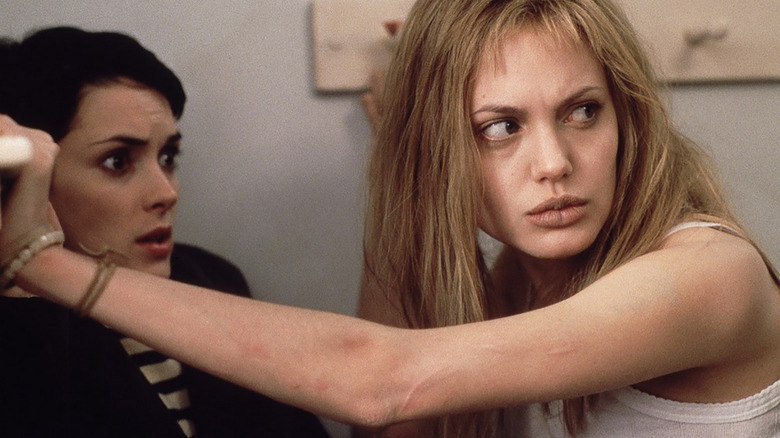
(Welcome to The Daily Stream, an ongoing series in which the /Film team shares what they've been watching, why it's worth checking out, and where you can stream it.)
The Movie: "Girl, Interrupted"
Where You Can Stream It: Netflix
The Pitch: Hollywood has never had a problem exploring or exploiting mental illness on screen, but seldom do they ever get it "right," for however you want to interpret what that means. Set in the 1960s on the brink of second-wave feminism, "Girl, Interrupted" is the cinematic adaptation of Susanna Kaysen's memoir of the same name recounting her experiences during her stay at a renowned mental institution for "troubled" young women. Following an attempt to take her own life, Susanna was diagnosed with borderline personality disorder while institutionalized and became part of a community of other women living with mental illness. The longer Susanna stayed within the confines of the institution, the harder it became for her to decide whether she wanted to return to the status quo of the world on the outside, or escape from it all with the captivating albeit dangerous Lisa (Angelina Jolie).
Trigger Warning: Discussions of mental illness, institutionalization, and suicide.
Why It's Essential Viewing
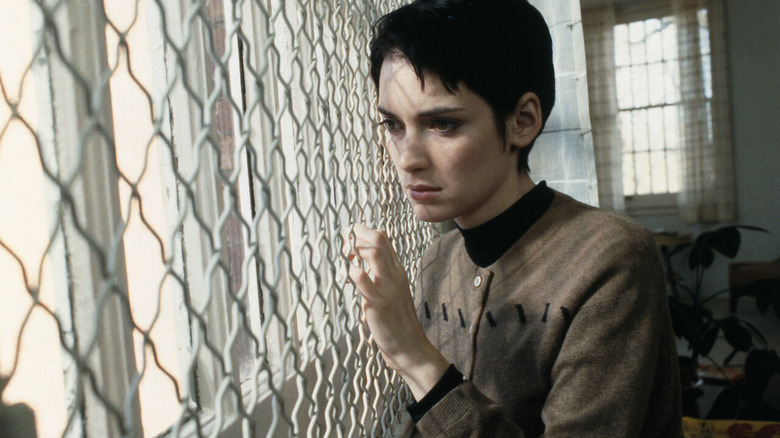
I woke up this morning bombarded with intrusive violent thoughts and the feeling of dread is swimming through my veins. I screamed out the window at a bird whose only crime was calling for its mother too close to my window, and I stared so long at a toaster that I forgot it was supposed to eat the bread after it popped out for breakfast until it had already cooled down into bread-flavored cardboard. On days like today, I feel as crazy as people would accuse me of being, and I feel so utterly alone. Like Kaysen, I've been institutionalized, and while I am grateful it was not during the 1960s, there are some things that never change.
Stephen Holden of the New York Times famously discounted the realities of women with mental illness in his 1999 review of the film, going so far as to describe Lisa as a "hopeless nut case" as if it were some sort of "gotcha" moment to reveal that some people struggle so deeply, they're difficult to help. Holden feels the emotional grounding of the film exists only with those trying to "fix" these girls, Whoopi Goldberg's understated nurse Valerie and Vanessa Redgrave's compassionate Dr. Wick. Once you get to the last line of his review, it is clear that he has never once empathized with a woman struggling with mental illness.
"Girl, Interrupted" is a small, intense period piece with a tough-love attitude toward lazy, self-indulgent little girls flirting with madness: You can drive yourself crazy, or you can get over it. The choice is yours.
If I had a dollar for every time someone suggested I just "get over it..."
The Ensemble Cast Is Fantastic
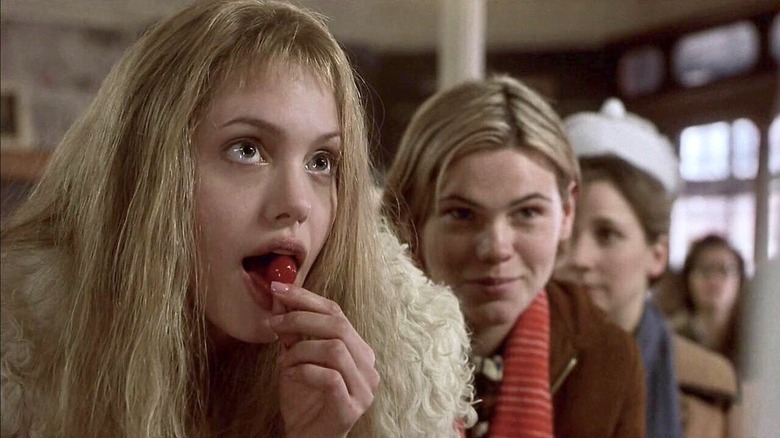
Winona Ryder, Angelina Jolie, Elisabeth Moss, Clea DuVall, Brittany Murphy, Angela Bettis, and Jillian Armenante comprise our main cast, and every one of them is firing on all cylinders. They each have their own mental issues to work through, some more extreme than others, but none of them are defined by their diagnosis. They sneak around the institution to go bowling, wreak havoc in an ice cream shop just because they can, and act as each other's support system when the supposed professionals fail them. When Moss' Polly is placed in isolation, the girls sneak out at night to sing to her from behind the door to soothe her worries.
Unfortunately, as this is a film about mentally unwell people set in the 1960s, it's also a brutal watch. Angelina Jolie's Lisa is punished with electro-shock therapy, Brittany Murphy's Daisy succumbs to her illness in a horrific manner, and Angela Bettis' Janet wears her pain on her sleeve and through her shrieks. As hard as it can be to watch, and as exploitative as it is viewed by many (which, fair), it's also so very difficult for me to not see them all as kindred spirits ... as my sisters.
"The Only Way To Stay Sane Is To Go A Little Crazy"
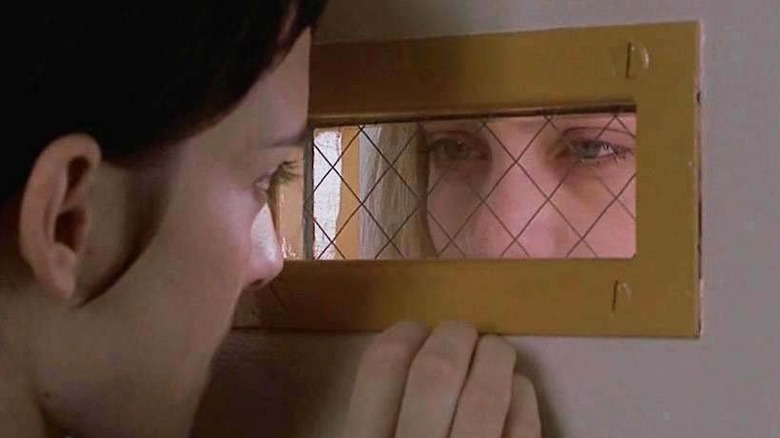
Like just about every mental institution movie (here's looking at you, "One Flew Over The Cuckoo's Nest"), there are moments that surely feel like a production company profiting off "looney bin tourism" by sensationalizing mental illness and psychiatric disorders for shock-value. But the brutal authenticity of the major players of "Girl, Interrupted" easily allows viewers to disconnect from the stereotypical residents repeating themselves in the corner or rambling at a television set that we never get a chance to fully understand. When Susanna is admitted, it's frequently implied that she was only sent because her wealthy socialite parents "didn't know what to do with her," and Susanna rejects the idea that there's anything wrong with her.
Girl, I've been there. As an insufferable overachiever for most of my life, I was convinced there was no way I could be mentally ill because I was able to "function" in a day-to-day environment and accomplish goals. What I didn't know is that the extreme emotional highs and lows I would experience between them were not typical, that everyone around me was not also constantly being pummeled with new ideas on how to cause myself bodily harm "just to know what it would feel like." Watching Susanna slowly come to accept her own mental unwellness helped me do the same, and watching her find solace with those who could empathize, inspired me to seek out my own "community of crazies" as well.
When A Psychological Drama Is Just Drama
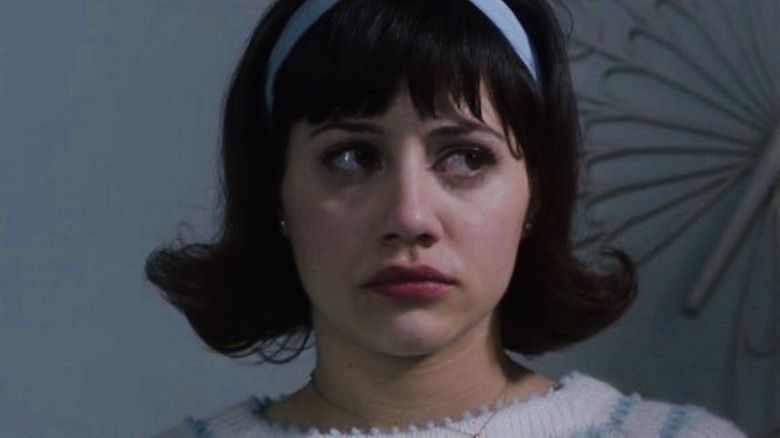
"Girl, Interrupted" is classified as a "psychological drama film," which to me has always felt like an ableist classification. Maybe this is a "psychological drama" to neurotypical people, but to me, it's just a drama. The psychological difficulties I and others like me experience aren't a one-time event or comfortably encapsulated over the course of a two-hour movie — it's how we have to live every day on this earth. Susanna doesn't leave the asylum suddenly "not crazy," she leaves just as "crazy" as she started, but now with a better grasp on how to handle her mental illness and keep herself out of self-harm's way. Lisa, on the other hand, is not as fortunate, and "Girl, Interrupted" is unafraid to point out that some mental illness diagnoses, not unlike cancer or a terminal injury, may ultimately be the cause of someone's demise.
"When you don't want to feel...death can seem like a dream. But, seeing death...really seeing it, makes dreaming about it f****** ridiculous."
In the two decades since the release of "Girl, Interrupted," the conversations around mental health have greatly improved, and, while still stigmatized, have made remarkable advances compared to where we once were. It is because of these conversations that we now have the language to critically assess the shortcomings of "Girl, Interrupted," but the film's existence still provides a much-needed outlet for anyone made to feel crazy because their brain chemistry is mixed a little differently than others.
If you or someone you know is struggling with mental health, please contact the Crisis Text Line by texting HOME to 741741, call the National Alliance on Mental Illness helpline at 1-800-950-NAMI (6264), or visit the National Institute of Mental Health website.
Read this next: The Daily Stream: Spencer Isn't A Horror Movie, But It Acts Like One
The post The Daily Stream: The Catharsis of Girl, Interrupted on Bad Mental Health Days appeared first on /Film.
0 Commentaires